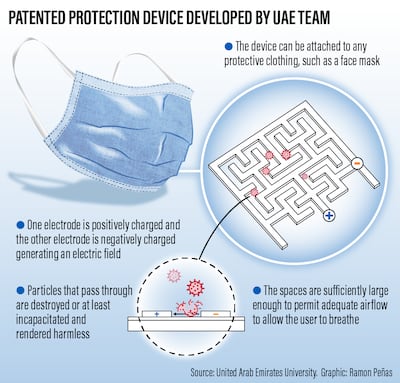Scientists in the UAE have invented an electric face mask they say is capable of killing viruses.
The device has two electrodes fitted to either side of a mask, which zap any viruses that enter the space, either completely destroying them or rendering them harmless.
The UAE University team, led by Dr Mahmoud Al Ahmad, have patented the idea and are now seeking investors to produce the masks at scale.
With investment, the masks should be made in bulk and sold cheaply, he said.
At this stage, the device looks like an electric strip that could be fitted to a variety of basic masks, rather than a bulky 'air purifying' device that several other developers have released.
UAE University
“These masks can be multi-layer,” said Dr Al Ahmad, an associate professor of engineering who has been working on Covid-research projects since the start of the pandemic.
“One layer will have electrodes and there will be spacing between these electrodes to allow for breathing.
“Whenever something is coming, like a virus, it will burn. Like the lamps that kill the mosquito in your house. It will kill it.”

He said although the project holds promise, and the masks have been proven to kill the virus that causes Covid-19, it cannot proceed without investment.
“We can make electrodes using flexible metals, so it will be cheap at high volume. But it needs funding,” he said.
The electrodes will be powered by a small coin battery, so there is no risk of electrocution to the wearer. They will not even be aware of the virus being zapped because it is so small, he said.
The technology can be used in any clothing, not just masks, and the settings can be adjusted to target different kinds of viruses, Dr Al Ahmad said.
“While the concept will require more development before being applied to personal protective equipment, it is an excellent start in this direction,” he said.
In October, researchers at Khalifa University revealed that they were working on masks that would filter out specific viruses, such as Covid-19 and the flu, using nanotechnology, which can slow or stop the spread of micro-organisms.
Studies have shown masks help to prevent the spread of airborne viruses, such as the coronavirus.
A recent study found face coverings reduced the number of coronavirus cases by 53 per cent, although many experts said the research was flawed because much of it was observational.
They said people who wear masks are more likely to be more careful, generally, so they naturally would be associated with lower numbers of Covid cases.
Experts said the real number may be more like a 10 per cent to 20 per cent reduction in the number of Covid cases.
That was confirmed by real-life evidence in a study in Bangladesh involving almost 350,000 people.
The results showed masks reduced symptomatic infections by about 11 per cent, according to a “gold standard” randomised controlled trial.
The protective effect was even better for people over 60, at almost 35 per cent.













